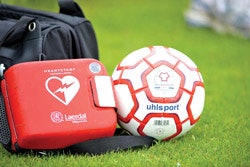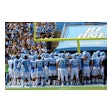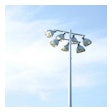While potentially fatal, an individual's ability to survive a sudden cardiac arrest can be greatly enhanced if the victim is treated immediately with defibrillation, an electrical pulse that can restart the heart.

While potentially fatal, an individual's ability to survive a sudden cardiac arrest can be greatly enhanced if the victim is treated immediately with defibrillation, an electrical pulse that can restart the heart. But time is critical; statistics show that the survival rate of individuals who suffer a sudden cardiac arrest drops to less than 2 percent if not shocked within 10 minutes. As a result, a number of states have passed legislation requiring AEDs in health and fitness facilities, airports, shopping malls, casinos, and community and senior citizen centers.
Yet almost none of the legislation currently on the books actually requires that the defibrillators be used in emergency situations. This fact, though counterintuitive, is what recently tipped Limones v. School District of Lee County [2013 Fla. App. LEXIS 1821] in favor of the defendant.
Two Arguments
Abel Limones was a soccer player for East Lee County High School. During an away game at Riverdale High School, Limones abruptly collapsed on the field, stopped breathing and within three minutes was found to have no discernible pulse. Riverdale's assistant principal called 911 while East Lee County's coach and a nurse bystander performed CPR. The coach testified that he called for an AED, but even though there was one on a golf cart parked near the soccer field's end zone, no one responded or retrieved it. The Fire Department and Emergency Medical Service personnel arrived on the scene almost simultaneously and used their own defibrillator to deliver a shock to Limones' heart and administered a series of intravenous medications, successfully resuscitating Limones 23 minutes after the 911 call.
During those 23 minutes, Limones suffered severe and permanent brain damage. The boy's parents sued the School Board of Lee County, claiming that it was negligent in failing to maintain an AED on or near the soccer field, failing to make it available for use, or failing to actually use its AED. Had the AED been used on Limones within one to two minutes of the time he stopped breathing and had no pulse, they argued, Limones would not have sustained the catastrophic brain injury.
The trial court ruled that the school board did not have a common-law duty to provide a reasonably safe environment for Limones. Second, they asserted a negligence claim based on the school board's failure to adhere to the terms of section 1006.165, Florida Statutes (2008), which requires public schools that are members of the Florida High School Athletic Association to have an AED.
In reviewing the first claim, the Court of Appeal of Florida, Second Circuit, held that under Florida law a school generally has a duty to adequately supervise its students, and this duty extends to athletic events. The school's duties, the court held, include: 1) providing adequate instruction, 2) supplying appropriate equipment, 3) reasonably selecting or matching athletes, 4) properly supervising events, and 5) utilizing appropriate post-injury efforts to protect injuries against aggravation. The court found that the board did have a common-law duty to use appropriate post-injury efforts to protect Limones' injury against aggravation. Once the court determined that such a duty existed, it moved on to consider the scope and extent of the duty, in particular, whether reasonably prudent post-injury efforts required making available and using an AED.
In ruling that the school board had no such duty, the court examined the decision by the Court of Appeal of Florida, Fourth District, in L.A. Fitness v. Mayer [980 So. 2d 550 (Fla. App. 2008)]. In that case, a health club patron suffered cardiac arrest and collapsed. While 911 was called, CPR was not performed on the patron, who eventually died. In determining that a business owner did not have a common-law duty to provide CPR or maintain or use an AED, the Fourth District noted that courts from other jurisdictions have uniformly refused to extend a business owner's duty beyond simply calling for medical assistance within a reasonable amount of time. Based on the L.A. Fitness case, the court concluded that the school board had no common-law duty to make available, diagnose the need for or use an AED on Limones.
Next, the family argued that even if the court found that the school board had no duty to use the AED, the board undertook a duty to safeguard Limones by acquiring an AED and training personnel in its use. The court ruled that while it was clearly established that one who undertakes to act, even when under no obligation to do so, becomes obligated to act with reasonable care, the family failed to show that the school board's action in acquiring the AED and training personnel in its use compelled the school board to ensure that the AED would be used in these circumstances.
As for Limones' second argument, the court found that while Section 1006.165 of the Florida Statutes imposes a duty on public schools to have an operational AED on school grounds, register its location and provide appropriate training, the law does not set forth a requirement for its use.
Future Implications
Though the court concluded that the school board's common-law duty did not include a duty to use an AED at sporting events, athletic administrators should be cautioned against considering this the last word in the management of sudden cardiac arrest incidents. The court made clear that the existence of a duty to take appropriate post-injury measures is not necessarily the same for all high school sports or athletes, and is definitely not a stagnant proposition - what may have been acceptable in the past may not continue to be acceptable in the future. If a law requires that a school have an AED on its grounds, the next logical step would be to require its use.
































